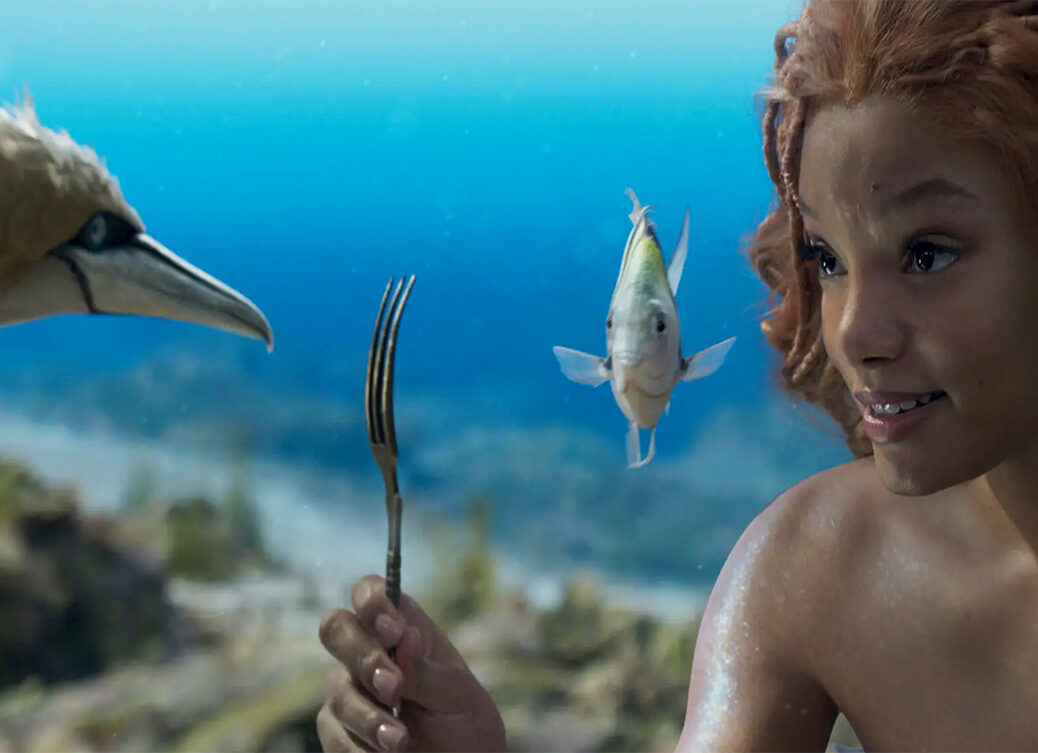
First they came for Cinderella and I said nothing. Then they came for Beauty and the Beast. And now they have come for The Little Mermaid.
It was inevitable that Disney would remake the film that spurred it to go on to create Mulan and Aladdin. The 1989 cartoon The Little Mermaid was a box-office hit, partly because Ariel was Disney’s first heroine with spunk, unlike her predecessors Sleeping Beauty and Snow White (a decent part of whose character arcs involved being catatonic). Horribly, however, conversation about the remake has been dominated by the racist backlash to Halle Bailey being cast as a black Ariel, as if the colour of her skin was the more fantastical part of the film.
The live-action plot remains largely faithful to the original: Ariel the mermaid has always been warned off humans by her father, but falls in love with Prince Eric, and makes a deal with the evil sea witch to turn her monofin into legs so she might live on land with him, even though it means losing her voice. The terms of this agreement may or may not come to haunt her later.
Bailey has a starry presence, her honeyed voice carrying the songs that have become the best known parts of the film. Sebastian the Jamaican-accented crab is amusing as ever – when assigned by his king to watch over the rebellious Ariel, he scuttles off muttering to himself, “I’m an educated crustacean, I don’t need this, I got options”. The CGI visuals are full of splendour: the “Under the Sea” sequence is popping with fuchsia anemones and lilac jellyfish in a way that will provoke ten-year-old girls to beg for fish tanks and lava lamps to turn their bedrooms into sea kingdoms. Meanwhile, Eric’s kingdom is a paradisaical island, with a riotous marketplace and a lagoon where, with as much comedy as in the original, he is hastened to “Kiss the Girl”.
The real question, though, is just how much you can update a film about a 16-year-old who shimmies around with seashells covering her breasts and ditches her voice because someone tells her that men don’t fancy women who talk. Superficially, the remake of The Little Mermaid looks progressive: Ariel’s sisters represent every ethnicity conceivable (leading you to wonder how far across the seas exactly their dad travelled), while the prince’s multiracial realm resembles Bridgerton. Changing Scuttle the seagull into a female gannet played by Awkwafina, of Crazy Rich Asians fame, was inspired (even if her awkward Scuttlebutt rap has been criticised online for appropriating black culture). There is a vague gesturing to contemporary issues: mermaids hate humans partly because they destroy their beautiful coral reef.
The filmmakers’ hope seems to be that if they use diverse casting the result will look like a culturally rich story. The problem is that it doesn’t feel like one. The Little Mermaid is crying out for a structural retelling drawing on racial dynamics. It has a father who doesn’t want his daughter dating someone of a different race – to which Ariel protests that “they’re just like us”. There are humans saying that mermaids are mere seductresses. There’s the exoticisation of Ariel, a silent, otherworldly girl, by a white guy. Come on, guys, you want to shout, it’s right in front of you. Except The Little Mermaid doesn’t go there.
The recent Disney films Encanto (2021) and Coco (2017) achieved critical acclaim because their plots were rooted in Colombian and Mexican culture and they included collaborations with local artists. The fictional nation of Wakanda in Black Panther drew on rich African history and politics. But in The Little Mermaid, apart from a few hints that the action takes place somewhere in the Caribbean, there is just a random collision of ethnicities, both pretend and real. We never understand why exactly mermaids and humans are so incompatible, except for a weak allusion to the murder of Ariel’s mother by a human. In its running time of 2 hours and 15 minutes – almost an hour longer than the animated version – the film fails to answer the questions it asks.
And then there’s Eric, played by a pleasantly-dimpled Jonah Hauer-King. He was never going to get an easy ride at a time where my generation of women blames Disney for our growing up with the idea that you need a man for a fairytale ending. We are supposed to think Eric is a benevolent, multiculturalist prince: his mother drops in a mention of his attempt to transport anti-malarial quinine on his merchant ship, and bemoans that he wants to be out travelling at sea, while he can’t resist showing off to Ariel his room of knick-knacks from places he’s travelled, like Cartagena. But he just gives off the vibe of a bloke who hasn’t felt fully himself since he went backpacking on his gap year and is trying to make a business out of alpaca wool he found in south America. Couldn’t Ariel do better?
Diverse casting is powerful: I’m glad to no longer live in a time where the only heroine who looked like me was Jasmine from Aladdin. But even better than seeing yourself reflected superficially is to see a little bit of your life experience and soul in a movie. The Little Mermaid has plenty of neat, ostensibly progressive additions, but it is not the deep reimagining that Ariel’s story deserved.
[See also: Stop with the movie remakes]






